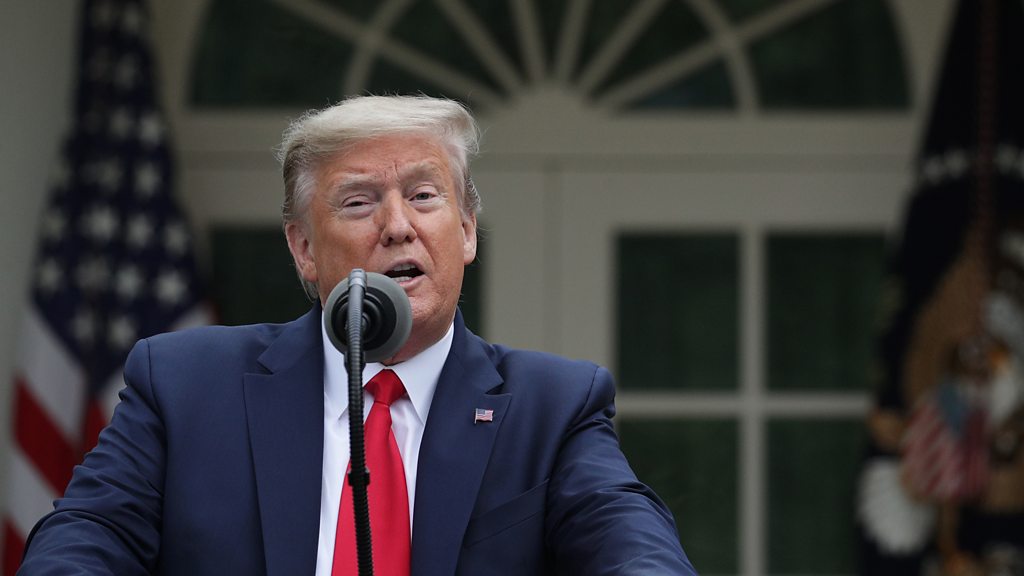Media playback is unsupported on your device
US President Donald Trump has said he is going to halt funding to the World Health Organization (WHO) because it has "failed in its basic duty" in its response to the coronavirus outbreak.
He accused the UN agency of mismanaging and covering up the spread of the virus after it emerged in China, and said it must be held accountable.
In response, the UN's chief said it was "not the time" to cut funds to the WHO.
Mr Trump has been under fire for his own handling of the pandemic.
He has sought to deflect persistent criticism that he acted too slowly to stop the virus's spread by pointing to his decision in late January to place restrictions on travel from China.
He has accused the WHO of having "criticised" that decision and of being biased towards China more generally.
"I am directing my administration to halt funding while a review is conducted to assess the World Health Organization's role in severely mismanaging and covering up the spread of the coronavirus," Mr Trump told a news conference at the White House on Tuesday.
The US is the global health body's largest single funder and gave it more than $400m in 2019.
A decision on whether the US resumes funding will be made after the review, which Mr Trump said would last 60 to 90 days.
The WHO is yet to directly respond but UN Secretary General António Guterres said the international community should be uniting "in solidarity to stop this virus".
"It is my belief that the World Health Organization must be supported, as it is absolutely critical to the world's efforts to win the war against Covid-19," he said.
Germany's foreign minister tweeted that strengthening the "under-funded" WHO was one of the best investments that could be made at this time.
What is the WHO - and who funds it?
- Founded in 1948 and based in Geneva, Switzerland, it is the UN agency responsible for global public health
- Has 194 member states, and aims to "promote health, keep the world safe and serve the vulnerable"
- Involved in vaccination campaigns, health emergencies and supporting countries in primary care
- Funded by a combination of members' fees based on wealth and population and voluntary contributions
- US provided 15% of its 2018-19 budget - with more than $400m
- China gave about $86m in 2018-19; UK gives most of any country apart from the US
The WHO launched an appeal in March for $675m to help fight the coronavirus pandemic and is reported to be planning a fresh appeal for at least $1bn.
Bill Gates, the Microsoft founder and philanthropist, said on Twitter: "Halting funding for the World Health Organization during a world health crisis is as dangerous as it sounds."
The Bill and Melinda Gates Foundation is the second-largest funder of the WHO.
What is Donald Trump's argument?
"With the outbreak of the Covid-19 pandemic, we have deep concerns whether America's generosity has been put to the best use possible," the US president said.
The US has by far the highest number of coronavirus cases and deaths worldwide- with more than 600,000 cases and 26,000 deaths.
Mr Trump accused the WHO of having failed to adequately assess the outbreak when it first emerged in the city of Wuhan.
"Had the WHO done its job to get medical experts into China to objectively assess the situation on the ground and to call out China's lack of transparency, the outbreak could have been contained at its source with very little death," he told reporters.
"This would have saved thousands of lives and avoided worldwide economic damage. Instead, the WHO willingly took China's assurances to face value... and defended the actions of the Chinese government."
Chinese officials initially covered up the outbreak of the virus in Wuhan, and punished whistleblowers who tried to raise the alarm. Beijing later imposed draconian restrictions, including quarantine zones on an unprecedented scale, drawing effusive praise from the WHO and its director-general, Tedros Adhanom Ghebreyesus.
WHO experts were only allowed to visit China and investigate the outbreak on 10 February, by which time the country had more than 40,000 cases.
White House reporters pointed out, however, that Mr Trump himself praised China's response to the outbreak and downplayed the danger of the virus at home long after the WHO had declared a "public health emergency of international concern".



 Africana55 Radio
Africana55 Radio 

